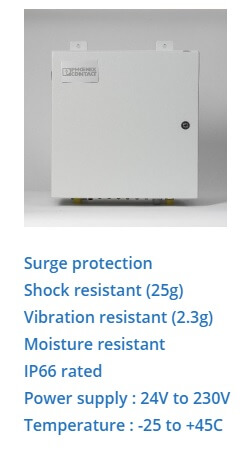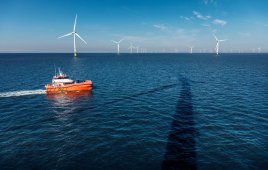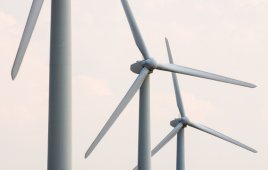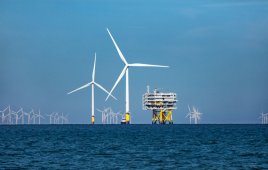As clean energy becomes increasingly adopted across the globe, researchers and companies from Massachusetts are working hard to spearhead the next great developments in cleantech—and MassCEC wants to help.

WeSense is WindESCo’s platform that changes how wind farm operators measure and utilize the wind to maximize performance while protecting expensive wind energy equipment. At the heart of the WindESCo offering is our intelligent rotor monitoring system, WeSense.
Now in its fourth consecutive year, MassCEC’s competitive InnovateMass program recently announced its newest awardees. InnovateMass seeks to guide innovative cleantech and water tech companies through what’s known as the “Commercialization Valley of Death:” the funding gap between early-stage and late-stage technology development which often stalls commercialization. The program tracks several different metrics throughout the course of each project – including the number of jobs created, funds leveraged, investors acquired, and strategic partners gained – to measure both the individual project’s success and the success of the program as a whole. InnovateMass aims to introduce a greater quantity and higher-quality of cleantech and water tech companies into the clean energy market.
The recent InnovateMass awardees, receiving grants of up to $150,000 from MassCEC, are:
- Somerville-based Menon Laboratories aims to install and field-test a water filtration unit in Barnstable County that will evaluate membrane performance for wastewater treatment. The Northeastern University spinoff company is hoping to see results that will significantly influence high-impact areas related to water reuse and recycling, as well as the extraction of nutrients and resources from wastewater.
- Resolute Marine, based in Amesbury, will spearhead the testing of a seawater-compatible hydraulic pumping system, which will generate power to purify seawater. It will also offset carbon emissions by replacing harmful oil- or glycol-based hydraulic fluids with seawater-compatible pumps.
- After a successful prototype deployment, WindESCois ready to move towards commercialization with a commercial scale application at a large wind farm. WindESCo hopes its technology will increase the lifespan and efficiency of a turbine, thereby eliminating waste and creating more efficiently-generated clean energy.
The InnovateMass team, accompanied by a technical consultant, The Cadmus Group, is excited to dive into these three new projects. Other WindESco news is here: https://goo.gl/WvVLvU.
The U.S. Department of Energy’s (DOE) National Renewable Energy Laboratory (NREL) will collaborate with 14 companies to address their critical technology challenges under the third round of DOE’s Small Business Vouchers (SBV) program.
“The Small Business Vouchers program focuses on connecting world-class DOE national laboratory capabilities, such as NREL’s Energy Systems Integration Facility and National Wind Technology Center, with American small businesses,” NREL SBV Program Manager Matt Ringer said. “Through these 14 new projects at NREL, small businesses will gain an important global competitive advantage for their advanced energy technologies, and our scientists will gain valuable insight into industry needs.”
DOE announced a total of 38 small businesses that will collaborate with national lab researchers through round three of SBV. The businesses selected will have access to unique capabilities in the DOE national laboratory system to help them overcome the technical challenges inherent in bringing innovations to market. NREL is one of eight national laboratories participating in this round of the program and will work with these 14 competitively selected small businesses:
- Arable Labs, Inc.(New Jersey) – Refine Arable’s Pulsepod technology, which quantifies solar resources by measuring variables and reporting data via integrated radios.
- BASiC 3C, Inc.(Colorado) – Develop a new semiconductor as a replacement for silicon. The semiconductor will provide greater efficiency, voltage capability, temperature operation, and higher tolerance to harsh operating conditions than existing models.
- Efficient Drivetrains, Inc.(California) – Test a lightweight, plug-in hybrid electric vehicle powertrain.
- Folsom Labs, Inc.(California) – Evaluate the HelioScope technology, a modeling software that helps design solar projects to provide municipalities and financial institutions with the data to compare this model to other, more costly and time-consuming processes.
- Iris Photovoltaics(California) – Scale up Iris’ innovative solar panel technology that has the potential to improve the efficiency of solar panels while leveraging existing manufacturing resources, and could substantially lower the cost of solar energy.
- Natel Energy, Inc.(California) – Model and evaluate the potential value streams of a portfolio of networked small hydropower generators. The project is designed to advance the understanding of the value of small hydro generation to the grid of the future.
- Peroxygen Systems Inc.(Tennessee) – Scale up Peroxygen Systems’ current electolyzer stack, which will enable the company to reach the production capacity needed for a commercial pilot trial with a customer.
- Radiant Labs(Colorado) – Expand NREL’s open-source residential building stock analysis tool (ResStock) to the multifamily building sector, which Radiant Labs is using to develop targeting and analytics platforms for cities.
- Sundog Solar Technology (New York) – Develop an advanced reflector technology and improve the technology’s weatherization design.
- WindESCo (Massachusetts) – Develop and apply roto-based sensors and cloud analytics to improve the technology’s energy output, reduce component failure, and increase the length of wind farms’ operational lifetimes.
- Wind Tower Technology (Colorado) – Conduct economic analysis of wind farm construction and levelized costs of energy of a self-erecting concrete wind turbine tower system.
The following three of the projects will be taking place in collaboration other national labs:
- NREL and Idaho National Laboratory working with US Geothermal, Inc.
- NREL and Sandia National Laboratories working with M2 Wave, LLC, and Sentient Science Corp.
- NREL and Argonne National Laboratory working with Gevo.
For a full list of small businesses competitively-selected by DOE in the third round of the SBV program, visit http://www.sbv.org. In the first two rounds of the program, 12 DOE national labs received funding to partner with 76 small businesses. With DOE’s announcement, SBV will have forged partnerships between 114 American small businesses and the national labs.
NREL is the U.S. Department of Energy’s primary national laboratory for renewable energy and energy efficiency research and development. NREL is operated for the Energy Department by The Alliance for Sustainable Energy, LLC.
Filed Under: Blades, O&M, Sensors



